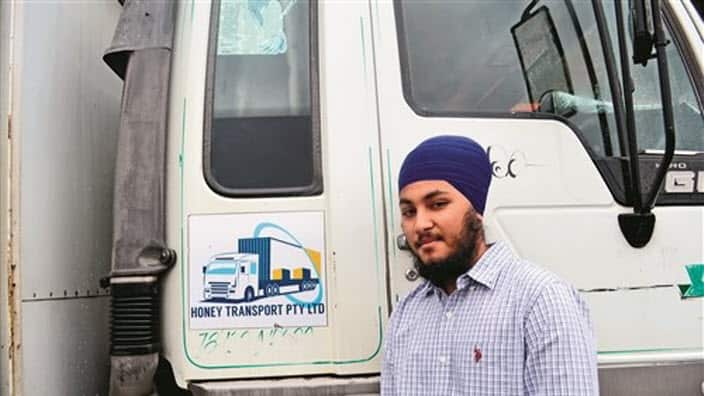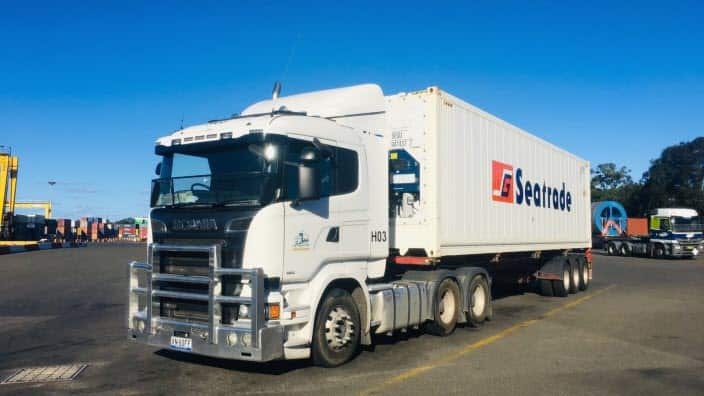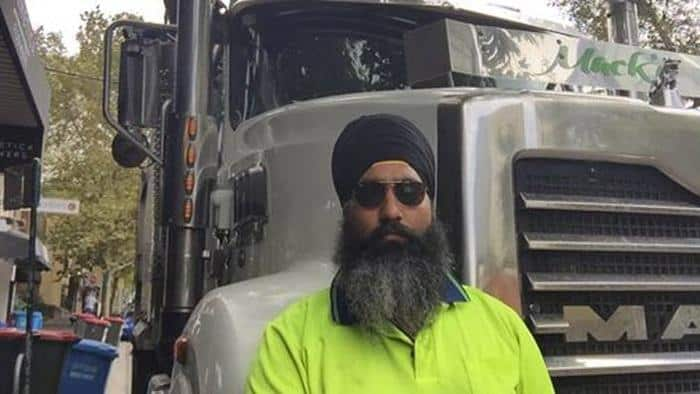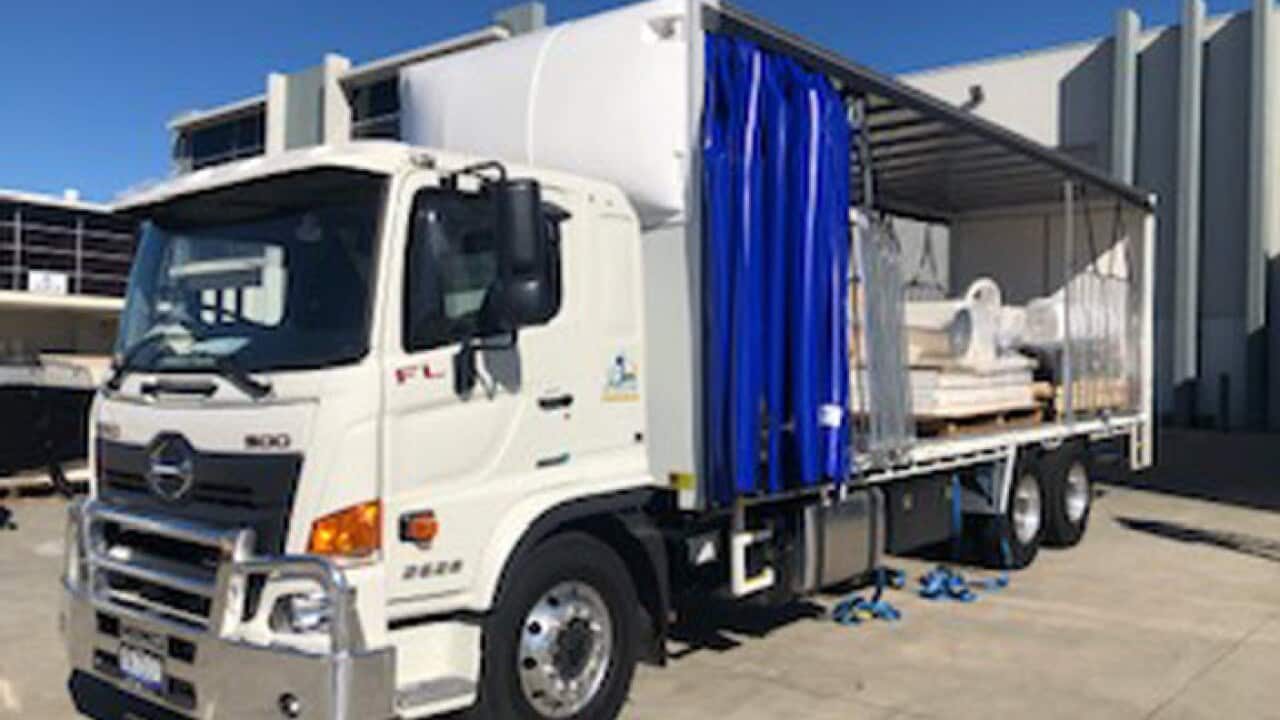A decade and many odd jobs later, Mr Singh marshalled all his savings and directed them into the trucking industry, like his father back in India, and acquaintances settled in Canada and the US.
What started with a single second-hand eight-tonne tipper in 2012, Mr Singh’s Sydney-based company, ‘Honey Transport’ today boasts of a 14-truck fleet and another eight trucks through its subcontractor network.
- Trucking emerged as the second-most common occupation that Punjabi speakers in Australia engaged in, as per ABS figures in 2016.
- Experts attribute the “ballooning interest” of the Indian migrants in the trucking industry to cultural factors and the surge of Indian-origin employers.
- Industry veterans discuss the merits of being an owner-operator vs company driver
The business which has gone through its own share of trials and triumphs is now helmed by Mr Singh’s son, Jaskirt Singh, who looks after the company’s finances and operations.
Jaskirt, also a 19-year-old business student, told SBS Punjabi that “trucking companies are as successful as management makes them.”
“If you have done the math right, you know enough about the demand and supply chain and are well-prepared for the volatile market conditions, then you’re made for trucking business,” said Mr Singh.

‘Punjabis drive Australia’
Over the years, Australia's trucking industry has shifted gears as many migrants, particularly from the northern Indian state of Punjab are rapidly filling an "acute" shortage of drivers.
According to Australian Bureau of Statistics data collected in the 2016 Census, truck driving emerged as the second-most common occupation that Punjabi speakers in Australia were engaged in at the time.
Manjeet Singh Bhinder, an owner-driver based in Perth attributed the “ballooning interest” of the Indian migrants in the trucking industry to cultural factors and the surge of Indian-origin employers.
“A lot of Indians, particularly from Punjab come from families with transport background. So they’re familiar with the industry and therefore, they find it relatively easy to find their footing.
“Secondly, many trucking companies nowadays are owned by Indians, so it becomes easier for migrants to secure a job and find someone who can guide you through,” said Mr Bhinder.
Opportunities in the trucking industry:
Peter Anderson, the CEO of the Victorian Transport Association said that for those planning to enter the trucking industry, now would be a good time.
“Demand for transport has never been higher thanks to population growth, low inflation on consumer goods and the proliferation of online shopping. Provided an operator can manage their costs and revenue, there are profits to be made in transport.
“A career as a professional truck driver can be extremely rewarding for people who want to be a part of an exciting, diverse and well-paying industry,” Mr Anderson told SBS Punjabi.
However, he added that operators must exercise cautious optimism before venturing into the industry.
“Transport is a hugely competitive industry with very low margins. Labour shortages, fluctuating business costs and managing increased from customers are just some of the challenges operators need to overcome to be successful,” added Mr Peterson.

Owner-operator vs company driver
Mr Bhinder who has handled accounts for several local trucking companies said every driver comes to a point where they debate whether to drive for a company or become an owner-operator.
“It’s a favourite topic of discussion and to be honest, deciding whether or not to buy your own truck is exactly like choosing between buying a house and renting an apartment.
“It really depends on your circumstances. While being an owner gives you greater flexibility when it comes to working, it also comes with significant responsibilities. Whereas a company driver is just like any other employee, who has to do what he is asked or expected to do,” added Mr Bhinder.
Karan Bhangu, who started working with a Sydney-based freight company less than a year ago, said while he has the financial resources, he believes he’s not yet ready to shoulder the responsibilities that come with owning a truck.
“If you’re new in the industry like me, then perhaps it would be better to learn the ropes as a company driver before taking on the significant financial and legal obligations of an owner-operator.
“Buying a new truck is as expensive as buying a house as the cost can vary anywhere between $80,000 to $150,000. You own it, therefore you pay for its repair, fuel and the responsibility to keep your truck up and running is also solely yours.
“Whereas a company driver’s responsibility ends, once you finish the job and park it in the lot,” said Mr Bhangu.

Is trucking as profitable as people think?
On the question of profitability, Melbourne-based single-truck owner-operator, Nav Sarkaria said Punjabis gravitating towards trucking are largely “missing the point.”
“We think, oh let’s buy a truck, it’s any way on loan, I’ll keep paying the instalments from the money I’ll make and the rest of it I would pocket. And after a few years, the truck would have been paid-off and I’ll live happily ever after. This is largely the thinking of a lot of people and, it’s far from the reality,” said Mr Sarkaria.
He added the fact that trucking can make you “instantly rich is the biggest misconception” as most set their eye on the gross earnings, but often overlook the expenses.
“If you’re set on becoming an owner-driver, make sure you do your research. You must know that the cost to run your business is not going to be the same as the bloke down the road, and is likely to change from year to year.
“Don’t forget that if you’re earning $10,000 a month, you also have to pay instalments for the vehicle and other variable costs like fuel, GST, taxes and also keep some for overhead expenses. After paying for everything, you’d be left with anywhere between $6000-6500,” added Mr Sarkaria.
If you’re thinking of starting your own trucking business, here’s a checklist:
Here’s a checklist based on the responses we received from industry veterans:
- Register your business
- Apply for licences, permits and insurance policies
- Choose a vehicle as per your need and buy or lease it depending on what’s right for you
- Find work which means loads to haul and establish a clientele
- Create a budget for fixed and variable costs and plan ahead for contingencies
- Know your tax and legal obligations
- Hiring drivers and workers, depending on your needs
Listen to SBS Punjabi Monday to Friday at 9 pm. Follow us on Facebook and Twitter.
